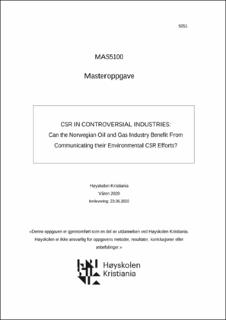| dc.description.abstract | As corporate social responsibility (CSR) initiatives are used more frequently as a marketing tactic, research is lacking on the subject with regard to controversial industries. The aim of this study is to contribute by adding knowledge about the factors that influence attitude in a setting of environmental CSR messages communicated by the oil and gas industry. The ultimate objective is to examine if and how the Norwegian oil and gas actors should communicate their efforts.
To examine this subject, a 2x2 experimental design was implemented, manipulating four advertisements to demonstrate the conditional factors of message source (internal vs. external) and message framing (positive vs. negative). Attitude was then examined as determined by each experimental condition, accounting for the effects of the mediating and moderating variables. The study’s findings provide evidence that attitude is influenced by how (message framing) and by who (message source) the message is communicated. However, these relationships are only significant when mediated and moderated by, respectively, the perceived authenticity of the source and by level of environmental concern.
Overall, in order to reach and affect those with higher levels of environmental concern, it is recommended that environmental CSR messages is framed in such a way that it enhances the possible gain of the initiative (positive framing).The message should also be communicated (or supported) by an external third-party, as this enhanced attitude, relative to the internal corporation source. Furthermore, the authenticity of the source proved to be an important mediator and direct predictor for attitude. Focus should therefor lay on presenting CSR efforts in an accurate, truthful, and transparent way. | en_US |

